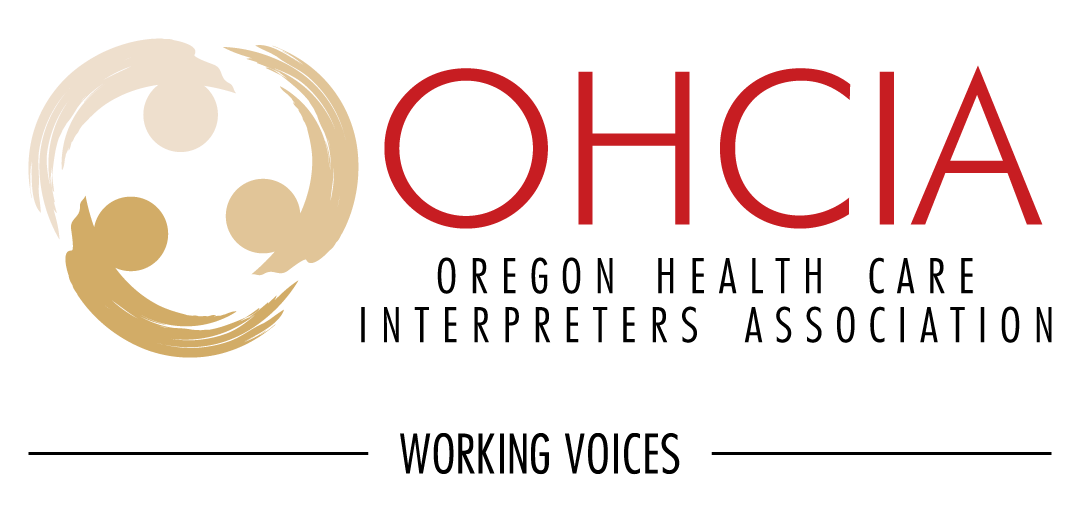OHCIA ONLINE CONTINUING EDUCATION
Course Information & Registration
Health Care Interpreters (HCI's) who are currently Certified or Qualified by the Oregon Health Authority (OHA) are required to take Continuing Education classes over the 4-year period in order to renew their credentials. For further information on renewal requirements, scroll down to the bottom of this page.
The OHCIA offers interactive and relevant classes designed to expand your interpreter knowledge in the areas of Interpreter Skills, Ethics, or Other Skills. Please check individual class information below for accreditation details. Classes may be approved for Continuing Education Units (CEUs) by CCHI, IMIA/NBCMI, or OHA.
In addition, some classes are accredited for certification renewal by the CCHI or IMIA/NBCMI.
Some classes may be eligible for Oregon Judicial Department (OJD) Continuing Education credit.
Non-accredited interpreters are encouraged to take our 60-hour Health Care Interpreter training.
REFUNDS: No cash refunds. Individuals who pay for a continuing education class and cannot attend may request a credit towards a future class if available. In the event a class is canceled, you will receive a voucher for a future CEU/class. NO EXCEPTIONS. If a refund is approved- it will be done through a check at the end of the month, if OHCIA received the request by the 20th of the month.
Heath Care Interpreter (HCl) Qualified and Certified Continuing Education Requirements
The HCl credential expires 4 years from the date you have been approved as a Qualified or Certified health care interpreter (HCl), as indicated on your determination Letter.
All renewing Qualified and Certified HCl's MUST complete 24 hours of OHA approved continuing education (CEU).
Renewing applicants must indicate the CEUs that fulfill the following requirements:
Six hours of health care interpreter ethics
Six hours of health care interpreter skills
An additional 12 hours that cover any topics accepted for continuing education by interpreter certification testing centers on the Authority maintained list provided for in OAR 950-050-0070
If you are planning to renew your credentials early, before the credential expiration date as indicated on your determination letter, moving from qualified to certified, you must still provide the required CEU hours on a proportional basis.
Moving from qualified to certified before expiration date:
The hours are calculated as follows:
The total number of CEUs needed is 24 CEUs; 6 skills, 6 ethics, and 12 other accepted topics. Dividing the 24 CEUs by 4 years:
1 year before your expiration date = 18 CEUs needed
2 years before your expiration date = 12 CEUs needed
3 years before your expiration date = 6 CEUs needed
OHA Renewal Video
Watch this short video to learn how renewal with OHA works and learn more.
ON-DEMAND CEUs
OHCIA is pleased to announce that its Continuing Education Units (CEUs) are now available on demand.
COURSE COMPLETION
The program is assessed solely on attendance. Students must attend the full class to receive credit. Certificates will be emailed within 1 week.
ABOUT OHCIA’s CONTINUING EDUCATION CREDIT:
OHCIA is proud that our Continuing Education classes are approved for credit by various accreditation organizations. Class Certificates of Completion indicate the number of Continuing Education Units (CEUs) are approved by each entity.
Effective 2018, NBCMI no longer automatically accepts CCHI-approved classes for re-certification. Interpreters who are applying for re-certification through the NBCMI can present their Certificate of Completion indicating the name of the class and the number of credit hours. Interpreters should contact NBCMI directly if they feel a class they have taken is eligible for CEUs.
OHCIA CEU Template
For your convenience, OHCIA created a template that you can use to keep track of the CEUs that you already earned and the ones you need still to take
